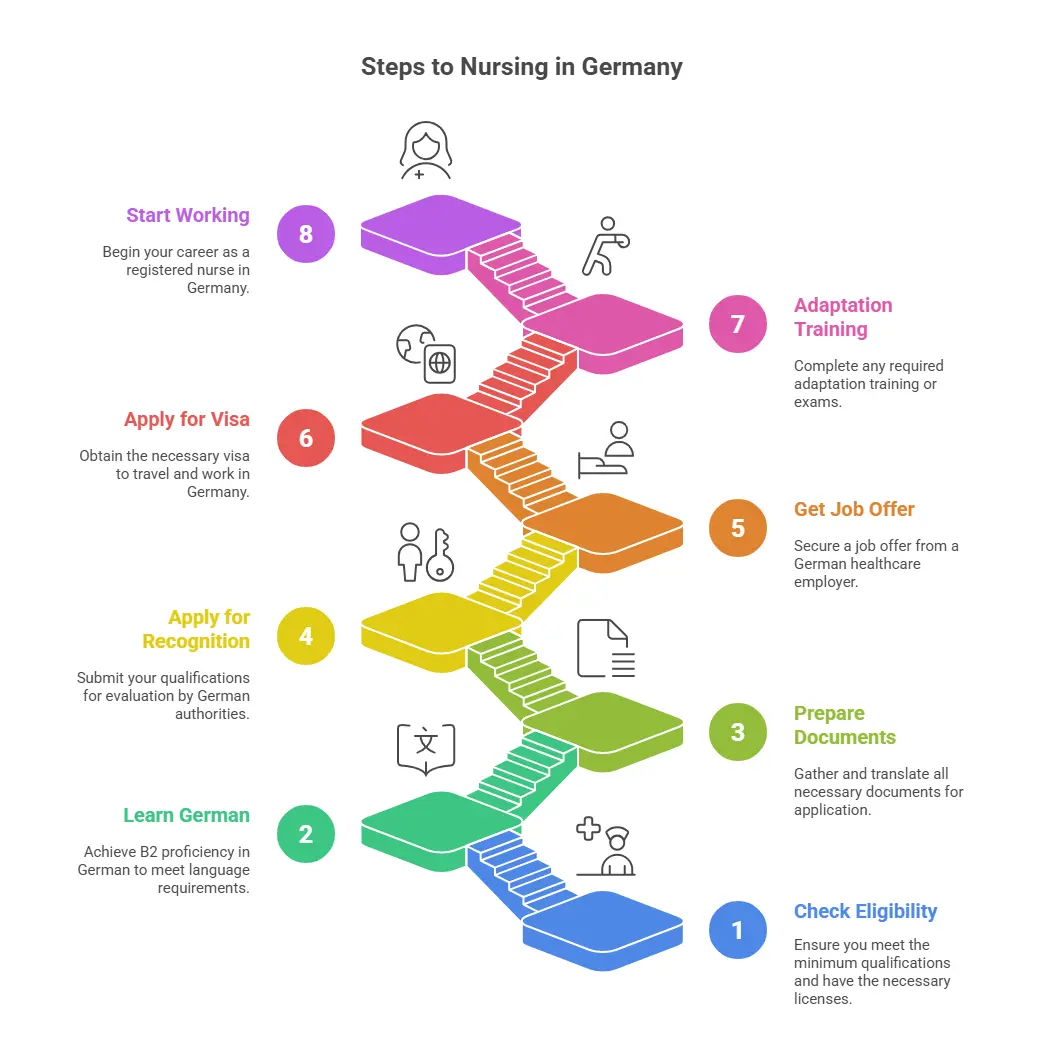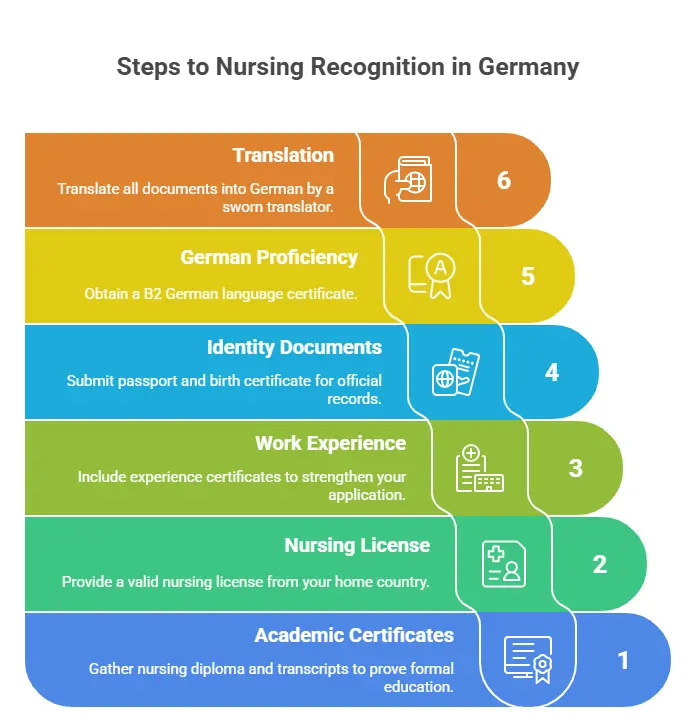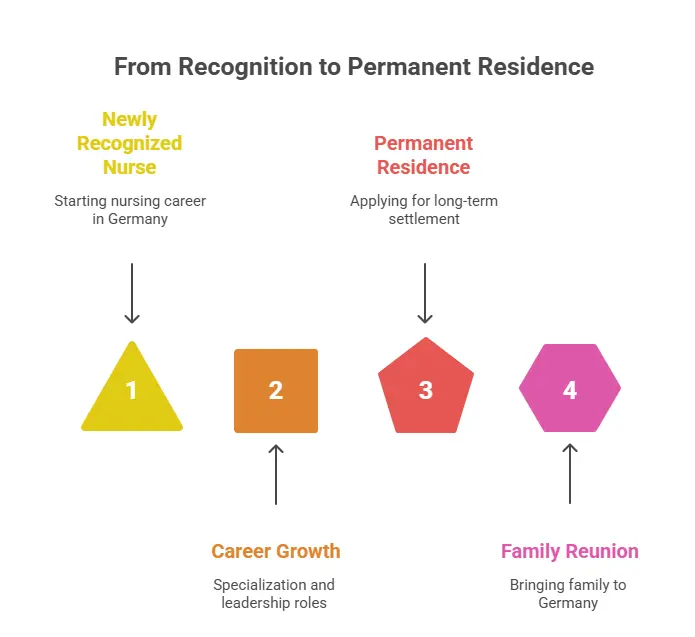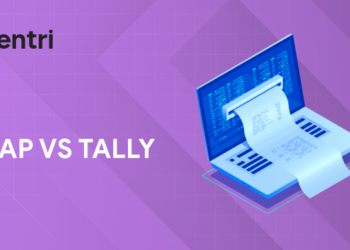Table of Contents
Germany is experiencing a major shortage of nurses. Hospitals, clinics and elderly care homes are struggling to find enough qualified employees to meet the needs of an aging population. For international nurses, it creates a golden opportunity. Working in Germany not only has stable jobs and attractive wages, but also long-term career growth, the opportunity for expertise and even permanent residence.
Demand is much greater than before – Germany needs more than 100,000 foreign nurses in the coming years. This means that if you are an educated nurse and are ready to learn German, you have good opportunities to create a successful career in one of the strongest healthcare systems in Europe.
Ready to take your German skills to the next level? Get Free Demo Classes Here!
Step-by-Step Process to Work as a Nurse in Germany
Step 1: Check Eligibility
Before you start the journey to work as a nurse in Germany, the first and most important step is to check whether you meet basic requirements. Germany has strict standards for health professionals, and ensure that you are eligibile, will later save time and effort in this process.
1. Minimum Qualification – Nursing Diploma or BSc Nursing
To apply for recognition as a nurse in Germany, you must complete formal nursing education in your country. This means you should hold a Diploma in Nursing or a Bachelor of Science in Nursing (BSc Nursing). The course should include both theory and practical training, as the German nursing standard is very wide. Without a recognized qualification, you cannot apply for registration.
2. Valid Nursing License in Your Home Country
In addition to your degree or diploma, you must also retain a valid nursing license in your country. This proves that you are legally allowed to work as a nurse and that you meet your country’s professional standards. When applying in Germany, you must show proof of your license, usually as an official certificate or registration documents.
3. Work Experience – Preferred but Not Always Mandatory
While some German states do not strictly require prior work experience, having at least 1–2 years of nursing experience in your home country is a big advantage. Employers often prefer candidates who already have practical skills and can adapt quickly to hospital work. Work experience also makes your application for recognition stronger and improves your chances of being hired faster.
4. Other Important Checks
In addition to qualifications and licenses, you should be ready to submit documents such as passports, transcripts, courses curriculum and police clearance certificates. They will be necessary later during the recognition process. Some states also as proof of German language learning (usually A2 or B1) before accepting your application.
Why This Step Matters
Checking the qualification is the basis for your journey. If your qualification is not recognized, you may need to undergo additional training or adaptation programs in Germany before working. By quick confirmation of your eligibility, you can avoid delay and plan the next stages – such as German learning and preparation for the recognition exam – with confidence.
Step 2: Learn the German Language (A1 → B2)
1: How do you say "Good Morning" in German?
Once you have confirmed your elibility criteria, the next step you should move on is to learn German. No matter how effective you are as a nurse, you cannot work in Germany without strong language skills. Communication is one of the important part in patient’s care, which is why the German authorities require foreign nurses to prove their language capacity before receiving licenses.
1. Minimum Requirement – B2 German
To officially recognize as a nurse in Germany, you need at least B2 level German language skill. At this stage, you can communicate safely with patients, doctors and colleagues, handle the emergency and complete the medical documents. Without B2 level knowledge, you can only qualify to support roles or training positions, not a complete nursing license.
2. German Language Exams
There are several recognized exams you can take to prove your German skills:
-
Goethe B2 – one of the most popular worldwide, accepted across Germany.
-
TELC B2 Pflege – designed especially for nurses and healthcare professionals.
-
ÖSD B2 – another widely recognized exam, especially in German-speaking countries.
Any of these certificates can be used for the recognition process, depending on the state or hospital.
3. Learning Path: From A1 to B2
-
A1 & A2: You learn the daily life conversations, some basic greetings, simple interactions. Which is helpful to settled in Germany, but is not enough for nursing.
-
B1: You can handle simple workplace conversations, understand health-related topics, and begin internships or training.
-
B2: You achieve the professional standard required to work as a registered nurse.
4. Tips for Learning German Effectively
- Admission to nursing-focused German courses: They associate everyday languages to medical terminology, who prepare you for real hospital conditions.
- Practice role play: Try interacting as explaining the drug, writing a shift report or talking to a patient about their symptoms.
- Join German-speaking groups: Talking to native speakers helps you build quick confidence.
- Study continuously: Dedicates at least 1-2 hours daily – small, but regular practice makes a big difference.
Why This Step Matters
Language is more than a requirement – this is the key to your success in Germany. The better your German, the easier it will be to mingle with people in the workplace, get in touch with patients and grow in your career.
Free German A1 Mock Tests – Powered by AI!
Test your skills on our interactive platform. Get instant feedback from our AI to help you communicate better and track your progress. Start your free German mock test now.
Test Your German A1 for FreeStep 3: Collect & Prepare Documents
When you start learning German, the next important step is to collect all the documents required for the nursing recognition process. Germany has very clear standards, and missing or incomplete documents can cause delays. Preparing everything makes the process very smooth.
1. Academic Certificates and Transcripts
You will need your nursing diploma or BSC nursing degree with detailed transcripts. These documents show that you have completed formal nursing education. In some cases, the authorities may also ask for your course curriculum to compare it with German nursing education.
2. Nursing License from Your Home Country
Valid nursing registration or license from your country is required. This indicates that you are allowed to practice nursing legally. Be sure to include your registration certificate and any renewal documents if necessary.
3. Work Experience Certificates
Although it is not always compulsory, having an experience certificate from hospitals or clinics can strengthen your application. These letters should ideally mention your position, responsibility and employment period. Employers in Germany value candidates with practical experience.
4. Identity Documents
You must also provide basic identity certificates as a passport and birth certificate. These are crucial for official records and verification.
5. Proof of German Proficiency
As part of the recognition process, you must submit the B2 German Language Certificate (Goethe, TELC or ÖSD). Without it, your application will not continue. If you are still studying German, you can start preparing the other documents in advance.
6. Translation into German
One of the most important stages is translation. All your certificates, transcripts and licenses should be translated into German by sworn translator (beeidigter Übersetzer). Common translations or self-discomfort are not accepted. The sworn translation ensures that German officials can confirm your documents correctly.
Why This Step Matters
Collecting and preparing your documents is the basis for the recognition process. Without complete and correctly translated paperworks, your application can be delayed or even rejected. By organizing everything quickly, you will be ready to move easily after being instead of your language certificate.
Step 4: Apply for Recognition (Anerkennung Process)
After collecting all the documents, the next step is to start the recognition process, known as Anerkennung in Germany. This is where the authorities officially decide whether your nursing qualification from abroad is similar to the German nursing standards. It is one of the most important steps in the jpurney to work as a nurse in Germany.
1. Where to Apply
You must submit your documents to the local recognition authority in the German State (Bundesland) where you plan to work. Each state has its own responsible office, which is usually linked to the health department. This means that the process may look a little different on the basis of the area, but basic requirements remain the same everywhere.
2. What the Authority Does
Once your documents are submitted, the authority carefully reviews your education, license, and experience. They compare your nursing curriculum and training hours with what is required in Germany. Since German nursing education is very detailed, they want to make sure you have the same level of skills and knowledge.
3. Possible Outcomes of Recognition
- Complete recognition: If your ability is considered equivalent to German nursing standards, you will receive complete recognition. This means that you can apply directly on a license (Berufserlaubnis) and start working as a registered nurse in Germany, provided you have your B2 level German certificate.
-
Partial Recognition: In many cases, the authority may find some differences between your training and German training. Don’t worry—this does not mean rejection. Instead you will be asked to complete one of the following:
-
Adaptation Course (Anpassungslehrgang): A practical training in a hospital or care facility where you fill the gaps in your knowledge.
-
Knowledge Exam (Kenntnisprüfung): A written and practical exam that tests whether you meet the missing requirements.
-
Once you successfully complete either the course or the exam, you will receive full recognition and can work as a registered nurse.
-
Rejection: In very rare cases, if your qualification is far below the required standard, recognition may be denied. However, this usually only happens if someone has very limited training. Most nurses are either fully or partially recognized.
4. Processing Time
The recognition process can take a few months, it depends on how complete the documents are and how busy the local authority. On average, the decision is expected between 3-6 months. Submitting correctly translated documents help you speed things up.
Why This Step Matters
Without recognition, you cannot work as a registered nurse in Germany, no matter how much you have experience. This process ensures that all nurses meet the same professional standards, which protect patient safety. For you, recognition is an official bridge between being a foreign-educated nurse and starting a career in Germany.
Ready to take your German skills to the next level? Get Free Demo Classes Here!
Step 5: Get a Job Offer from a German Employer
Once your recognition process is underway, the next step is to secure a job offer in Germany. Having an employer ready to hire you is important not only for starting your career but also because the offer letter is required for your visa application.
1. Where to Apply
There are several ways to find nursing jobs in Germany:
-
Hospitals and Clinics – Many public and private hospitals actively hire international nurses to fill their staff shortages.
-
Elderly Care Homes – With an aging population, Germany has a high demand for nurses in senior care facilities.
-
Recruitment Agencies – Specialized agencies connect international nurses with German employers. They often help with interviews, paperwork, and relocation.
2. Why the Job Offer Matters
An official job offer letter (Arbeitsvertrag) is more than just a piece of paper. It confirms that a German employer is ready to hire you once your recognition and visa are complete. The immigration office will ask for this letter as part of your visa application, so it’s a mandatory step in the process.
3. What Employers Look For
German employers want to see that you:
-
Have the right nursing qualification and license.
-
Hold at least B1 or B2 German language skills (B2 is usually required for direct patient care).
-
Are committed to working in Germany long term.
Having some prior nursing experience makes you an even stronger candidate.
4. Support from Employers
Many German hospitals and care homes understand the challenges international nurses face. Some employers offer extra support, such as:
-
Sponsoring your German language course.
-
Providing temporary housing.
-
Helping with paperwork and relocation.
This makes the transition much easier for nurses coming from abroad.
Why This Step Matters
Without a job offer, you cannot move forward with your visa application. It is the official confirmation that Germany not only recognizes your skills but also needs your help in its healthcare system. For you, it’s the gateway to stability, income, and a new life in Germany.
Free German A1 Mock Tests – Powered by AI!
Test your skills on our interactive platform. Get instant feedback from our AI to help you communicate better and track your progress. Start your free German mock test now.
Test Your German A1 for FreeStep 6: Apply for Visa & Travel to Germany
Once you have your job offer in hand and your recognition process is moving forward, the next step is to apply for your visa. This is the official permission that allows you to enter Germany and begin your nursing career.
1. Types of Visa for Nurses
There are two main visa options for international nurses:
-
Work Visa – This is for nurses who already have their qualifications recognized and hold a job offer. With this visa, you can directly start working as a registered nurse in Germany.
-
Recognition Visa (Anerkennungsvisum) – If your qualification is only partially recognized, you can apply for this visa to enter Germany, complete your adaptation course or knowledge exam, and then gain full recognition. This pathway is very common for international nurses.
2. Documents You Need
When applying at the German embassy or consulate in your country, you’ll need to prepare a set of documents. These usually include:
-
Your job offer or employment contract from a German employer.
-
Proof of recognition or confirmation that your application is in progress.
-
Proof of German language skills (usually B1 or B2 certificate).
-
Financial statements or blocked account to show you can support yourself until you start earning.
-
Basic documents like passport, birth certificate, and health insurance.
3. Embassy Interview
After submitting your application, you’ll be invited to an interview at the German embassy. This is usually straightforward. They may ask about your nursing background, your German language studies, and your plans in Germany. The main goal is to check that your documents are genuine and that you are prepared for the move.
4. Processing Time
Visa processing times vary, but on average it takes 6–12 weeks. Applying early and ensuring your paperwork is complete will help avoid delays.
5. Traveling to Germany
Once your visa is approved, you can book your ticket and travel to Germany. Many employers arrange for airport pickup or provide temporary housing, which makes your arrival smoother. From there, you’ll begin your adaptation program or start your job, depending on your recognition status.
Why This Step Matters
The visa is your bridge from planning to reality. It’s the official step that turns your dream of working as a nurse in Germany into a new chapter of your life abroad.
Step 7: Adaptation Training / Knowledge Exam (if required)
Not all foreign nursing qualifications perfectly match German standards. If the recognition authority finds gaps in your education or training, you will be asked to complete either an adaptation training program or a knowledge exam. Both pathways lead to the same goal: full recognition as a registered nurse (Gesundheits- und Krankenpfleger/in) in Germany.
1. Adaptation Training (Anpassungslehrgang)
This option is like an orientation period in a German hospital or care facility. During the training, you work under supervision and learn how German healthcare systems operate. You’ll also practice using German medical terminology, documentation methods, and local nursing procedures. The length of the training can vary, usually lasting 6 months to 1 year, depending on what the authority requires. At the end, your performance is evaluated, and if you successfully complete the program, you gain full recognition.
2. Knowledge Exam (Kenntnisprüfung)
Instead of training, some nurses choose to take the Kenntnisprüfung, which is a knowledge test. This exam checks whether your professional skills match German standards. It usually includes both a written part and a practical part. For example, you might have to answer case-based questions about patient care and also demonstrate practical nursing tasks. Passing the exam shows that your knowledge is equivalent to a German-trained nurse.
3. Choosing the Right Path
In many cases, the recognition authority will decide for you whether you must take the adaptation course or the exam. Sometimes, you may be given the choice. If you prefer hands-on learning, the adaptation program might be better. If you are confident in your theory and practical knowledge, the exam could be a faster option.
4. Why This Step Matters
Completing this step is crucial because it turns your partial recognition into full recognition. Once you succeed, you will officially hold the German nursing title Gesundheits- und Krankenpfleger/in. From that point, you can work independently as a registered nurse, apply for better positions, and enjoy the full salary and benefits of the profession.
Step 8: Start Working as a Registered Nurse in Germany
Once you’ve completed the recognition process, you can finally begin your career as a registered nurse in Germany. This is the stage where all your hard work—learning German, preparing documents, and passing exams—pays off.
As a newly recognized nurse, you can expect a starting salary of around €2,800 to €3,800 per month (before taxes). The exact amount depends on the region, employer, and whether you are working in a hospital, clinic, or elderly care home. Over time, your salary increases with experience, additional training, and specialization. Nurses who take on advanced roles or work in intensive care, surgery, or management positions can earn significantly more.
Career Growth
Working as a nurse in Germany doesn’t just mean a good salary. It also opens the door to continuous professional growth. You can specialize in areas such as pediatrics, intensive care, or anesthesia. With experience, you may move into leadership roles, such as head nurse or nursing educator. The German healthcare system strongly values further education, which means motivated nurses always have opportunities to advance.
Path to Permanent Residence
Beyond your career, becoming a registered nurse in Germany also creates a pathway for long-term settlement. After working for a few years, you can apply for permanent residence. This gives you more stability, freedom, and security in your personal life.
Family Reunion:
Many international nurses also choose to bring their families to Germany once they are settled. With a stable job and residence permit, you can apply for family reunion visas, allowing your spouse and children to join you. This makes nursing in Germany not only a professional opportunity but also a chance to build a new life with your loved ones.
Conclusion
Start learning German today to fast-track your career in Germany!
To start working as a registered nurse in Germany, you need three main things: the right nursing qualification, at least B2 level German, and successful completion of the recognition process. Once these steps are done, you can begin your career with a good salary, stable job opportunities, and even the chance to bring your family with you.
If your goal is to work in Germany, the best time to start is now. Begin preparing your documents, enroll in a German course, and learn about the recognition process in your target state. Every step you take brings you closer to a rewarding nursing career in one of the strongest healthcare systems in the world.
Free German A1 Mock Tests – Powered by AI!
Test your skills on our interactive platform. Get instant feedback from our AI to help you communicate better and track your progress. Start your free German mock test now.
Test Your German A1 for FreeFrequently Asked Questions
How long does it take to complete the process?
On average, the process takes 12 to 18 months from the time you start learning German until you begin working in Germany. The timeline depends on how quickly you reach B2 level German, how fast the recognition authority processes your documents, and the availability of exams or adaptation training.
Can I apply with only A1 or A2 German?
With A1 or A2 German, you cannot work as a registered nurse. At this stage, you only know basic greetings and simple conversations. However, you can use this time to start the recognition process and prepare your documents. For actual nursing work, you must reach B2 level German. Some nurses move to Germany with A2 or B1 using a Recognition Visa and continue their language training there, but B2 is still required for a full license.
What is Anerkennung?
Anerkennung is the official recognition process of your nursing qualification in Germany. The local health authority compares your education and training with German standards. If your qualification is fully equivalent, you receive recognition immediately. If there are gaps, you’ll need to complete either an adaptation training (Anpassungslehrgang) or a knowledge exam (Kenntnisprüfung) to achieve full recognition. Without Anerkennung, you cannot work as a registered nurse.
Do I need work experience to apply as a nurse in Germany?
Work experience is not always mandatory, but it is highly preferred. Nurses with at least 1–2 years of clinical experience often find jobs faster and are more confident in handling patients. Some German employers even require prior work experience, while others accept fresh graduates. In short, you can apply without work experience, but having it gives you an advantage.
Work experience is not always mandatory, but it is highly preferred. Nurses with at least 1–2 years of clinical experience often find jobs faster and are more confident in handling patients. Some German employers even require prior work experience, while others accept fresh graduates. In short, you can apply without work experience, but having it gives you an advantage.
What is the salary of Indian nurses in Germany?
The starting salary for Indian nurses in Germany is around €2,800 to €3,800 per month (before tax) once they are fully recognized at B2 level. With specialization, overtime, and experience, this salary can rise to €4,500 or more. Compared to India, the pay is significantly higher, and nurses also benefit from stable working hours, social security, and opportunities for permanent residence.














